Semiotics is the systematic study of sign processes and the communication of meaning. In semiotics, a sign is defined as anything that communicates intentional and unintentional meaning or feelings to the sign's interpreter.

Thomas Albert Sebeok was a Hungarian-born American polymath, semiotician, and linguist. As one of the founders of the biosemiotics field, he studied non-human and cross-species signaling and communication. He is also known for his work in the development of long-time nuclear waste warning messages, in which he worked with the Human Interference Task Force to create methods for keeping the inhabitants of Earth away from buried nuclear waste that will still be hazardous 10,000 or more years in the future.

Sign Systems Studies is a peer-reviewed academic journal on semiotics edited at the Department of Semiotics of the University of Tartu and published by the University of Tartu Press. It is the oldest periodical in the field. It was initially published in Russian and since 1998 in English with Russian and Estonian language abstracts. The journal was established by Juri Lotman as Trudy po Znakovym Sistemam in 1964. Since 1998 it has been edited by Kalevi Kull, Mihhail Lotman, and Peeter Torop. Since 2022, Ott Puumeister leads the editorial team. The journal is available online from the Philosophy Documentation Center, indexed by WoS and Scopus, and starting 2012 also on an open access platform.

This Charles Sanders Peirce bibliography consolidates numerous references to the writings of Charles Sanders Peirce, including letters, manuscripts, publications, and Nachlass. For an extensive chronological list of Peirce's works, see the Chronologische Übersicht on the Schriften (Writings) page for Charles Sanders Peirce.

Kalevi Kull is a biosemiotics professor at the University of Tartu, Estonia.

John Deely was an American philosopher and semiotician. He was a professor of philosophy at Saint Vincent College and Seminary in Latrobe, Pennsylvania. Prior to this, he held the Rudman Chair of Graduate Philosophy at the Center for Thomistic Studies, located at the University of St. Thomas (Houston).

The University of Hawaiʻi Press is a university press that is part of the University of Hawaiʻi.

Robert S. Corrington is an American philosopher and author of many books exploring human interpretation of the universe as well as biographies on C.S. Peirce and Wilhelm Reich. He is currently the Henry Anson Buttz Professor of Philosophical Theology at Drew University in Madison, New Jersey. Before that he was a professor at Pennsylvania State University. He is a Senior Fellow of the American Institute for Philosophical and Cultural Thought.
The Semiotic Society of America is the major and leading semiotics organization in North America, serving scholars from many disciplines with common interests in semiotics, the study of signs and sign systems. It was founded in 1975. Its official journal is The American Journal of Semiotics. The Society also publishes the proceedings of its annual conferences. Memberships in the society and publication of the journal are managed by the Philosophy Documentation Center.
Cognitive semiotics is the study model of meaning-making, applying methods and theories from semiotics, linguistics, psychology, cognitive science, computational modeling, anthropology, philosophy and other sciences. Contrary to classical cognitive science, cognitive semiotics is explicitly involved with questions of meaning, having recourse, when possible, to semiotic terminology, although developing it when necessary. As against classical semiotics, cognitive semiotics aims to incorporate the results of other sciences, using methods ranging from conceptual and textual analysis as well as experimental and ethnographic investigations.

The Philosophy Documentation Center (PDC) is a non-profit publisher and resource center that provides access to scholarly materials in applied ethics, classics, philosophy, religious studies, and related disciplines. It publishes academic journals, conference proceedings, anthologies, and online research databases, often in cooperation with scholarly and professional associations. It also provides membership management and electronic publishing services, and hosts electronic journals, series, and other publications from several countries.

The American Journal of Semiotics is a peer-reviewed academic journal covering semiotics. It was established in 1981 and is the official journal of the Semiotic Society of America. The journal publishes articles, responses or comments, and critical reviews. All volumes are available online from the Philosophy Documentation Center.
The Society for Phenomenology and Existential Philosophy (SPEP) is a philosophical society whose initial purpose was to promote the study of phenomenology and existentialism but has since expanded to a wide array of contemporary philosophical pursuits, including critical theory, feminist philosophy, poststructuralism, critical race theory, and increasingly non-Eurocentric philosophies. SPEP was created in 1962 by American philosophers who were interested in Continental philosophy and were dissatisfied with the analytic dominance of the American Philosophical Association. It has since emerged as the second most important philosophical society in the United States. Alan D. Schrift and Shannon Sullivan are the current Executive Co-Directors of SPEP.

Social Philosophy Today is a peer-reviewed interdisciplinary journal sponsored by the North American Society for Social Philosophy. It was established in 1988 by founding editors Yeager Hudson and Creighton Peden. The journal provides a forum for in-depth discussion of contemporary social issues. Each issue includes peer-reviewed papers drawn from those presented at the International Social Philosophy Conference, the annual event of the North American Society for Social Philosophy. The journal also accepts original submissions not previously submitted to the International Social Philosophy Conference but which address the conference theme or respond to previously published Social Philosophy Today articles. The journal is published by the Philosophy Documentation Center.

Jesper Hoffmeyer was a professor at the University of Copenhagen Institute of Biology, and a leading figure in the emerging field of biosemiotics. He was the president of the International Society for Biosemiotic Studies (ISBS) from 2005 to 2015, co-editor of the journal Biosemiotics and the Springer Book series in Biosemiotics. He authored the books Biosemiotics: An Examination into the Signs of Life and the Life of Signs and Signs of Meaning in the Universe and edited A Legacy for Living Systems: Gregory Bateson as Precursor to Biosemiotics.
The following outline is provided as an overview of and topical guide to semiotics:

Philosophia Christi is a biannual peer-reviewed academic journal published by the Evangelical Philosophical Society with the support of Biola University. It covers philosophical issues in the fields of apologetics, ethics, theology, and religion from an evangelical perspective and publishes articles, philosophical notes, and book reviews. The editor-in-chief is Ross Inman.

Susan Petrilli is an Italian semiotician, professor of philosophy and theory of languages at the University of Bari, Aldo Moro, Italy, and the seventh Thomas A. Sebeok Fellow of the Semiotic Society of America. She is also International Visiting Research Fellow at the School of Psychology, the University of Adelaide, South Australia.
The Journal of the Society of Christian Ethics is a biannual peer-reviewed academic journal, sponsored by the Society of Christian Ethics, that examines social, economic, political, and cultural problems within the context of Christian social ethics. It was established in 1981 as The Annual of the Society of Christian Ethics and was reorganized as a journal in 2002. For many years, the journal was published by Georgetown University Press. Since 2019 it has been published in print and electronic formats by the Philosophy Documentation Center.












